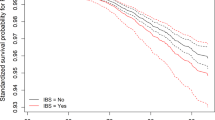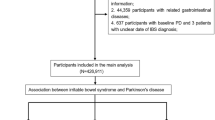Abstract
This study investigated whether an association exists between irritable bowel syndrome (IBS) and the risk of Parkinson’s disease. This is a retrospective cohort study using the dataset of the Taiwan National Health Insurance Program from 2000 to 2010. We identified 23,875 patients (aged 20 years or older) with newly diagnosed IBS as the IBS group and 95,500 subjects without IBS as the non-IBS group for comparison. The main outcome was incident Parkinson’s disease compared between both groups by the end of 2010. We measured the hazard ratio (HR) to evaluate the association between IBS and Parkinson’s disease. The overall incidence of Parkinson’s disease in the IBS group was 1.76-fold higher than that in the non-IBS group (16.4 vs. 9.33 per 10,000 person-years). The multivariable Cox proportional hazards regression analysis revealed that the adjusted HR of Parkinson’s disease associated with IBS was 1.48 (95 % CI 1.27, 1.72), compared with the non-IBS group. Age, women, hypertension, dementia, cerebrovascular disease and depression were also significantly associated with Parkinson’s disease. Patients with irritable bowel syndrome are at an increased risk of developing Parkinson’s disease. Further studies are required to explore the pathophysiological connection between these disorders.

Similar content being viewed by others
References
Lovell RM, Ford AC. Global prevalence of and risk factors for irritable bowel syndrome: a meta-analysis. Clin Gastroenterol Hepatol. 2012;10(712–721):e714.
Appendix A Rome III Diagnostic Criteria for Functional Gastrointestinal Disorders. [cited in 2013 January]. http://www.romecriteria.org.
Jellema P, van der Windt DA, Schellevis FG, van der Horst HE. Systematic review: accuracy of symptom-based criteria for diagnosis of irritable bowel syndrome in primary care. Aliment Pharmacol Ther. 2009;30:695–706.
Mach T. The brain-gut axis in irritable bowel syndrome–clinical aspects. Med Sci Monit. 2004;10:RA125–31.
Ohman L, Simren M. New insights into the pathogenesis and pathophysiology of irritable bowel syndrome. Dig Liver Dis. 2007;39:201–15.
Katiraei P, Bultron G. Need for a comprehensive medical approach to the neuro-immuno-gastroenterology of irritable bowel syndrome. World J Gastroenterol. 2011;17:2791–800.
Chaudhuri KR, Healy DG, Schapira AH. Non-motor symptoms of Parkinson’s disease: diagnosis and management. Lancet Neurol. 2006;5:235–45.
Poewe W. Non-motor symptoms in Parkinson’s disease. Eur J Neurol. 2008;15(Suppl 1):14–20.
Chaudhuri KR, Martinez-Martin P, Schapira AHV, et al. International multicenter pilot study of the first comprehensive self-completed nonmotor symptoms questionnaire for Parkinson’s disease: the NMSQuest study. Mov Disord. 2006;21:916–23.
Martinez-Martin P, Schapira AHV, Stocchi F, et al. Prevalence of nonmotor symptoms in Parkinson’s disease in an international setting; Study using nonmotor symptoms questionnaire in 545 patients. Mov Disord. 2007;22:1623–9.
Natale G, Pasquali L, Paparelli A, Fornai F. Parallel manifestations of neuropathologies in the enteric and central nervous systems. Neurogastroenterol Motil. 2011;23:1056–65.
Cersosimo MG, Benarroch EE. Pathological correlates of gastrointestinal dysfunction in Parkinson’s disease. Neurobiol Dis. 2012;46:559–64.
Ferrer I, Lopez-Gonzalez I, Carmona M, et al. Neurochemistry and the non-motor aspects of PD. Neurobiol Dis. 2012;46:508–26.
Lai SW, Liao KF, Liao CC, et al. Polypharmacy correlates with increased risk for hip fracture in the elderly: a population-based study. Medicine. 2010;89:295–9.
Lai SW, Su LT, Lin CH, et al. Polypharmacy increases the risk of Parkinson’s disease in older people in Taiwan: a population-based study. Psychogeriatrics. 2011;11:150–6.
Lai SW, Chen PC, Liao KF, et al. Risk of hepatocellular carcinoma in diabetic patients and risk reduction associated with anti-diabetic therapy: a population-based cohort study. Am J Gastroenterol. 2012;107:46–52.
Peters TJ. Multifarious terminology: multivariable or multivariate? Univariable or univariate? Paediatr Perinat Epidemiol. 2008;22:506.
Lebouvier T, Neunlist M, Bruley des Varannes S, et al. Colonic biopsies to assess the neuropathology of Parkinson’s disease, its relationship with symptoms. PLoS One. 2010;5:e12728.
Pouclet H, Lebouvier T, Coron E, et al. A comparison between rectal and colonic biopsies to detect Lewy pathology in Parkinson’s disease. Neurobiol Dis. 2012;45:305–9.
Cersosimo MG, Benarroch EE. Autonomic involvement in Parkinson’s disease: pathology, pathophysiology, clinical features and possible peripheral biomarkers. J Neurol Sci. 2012;313:57–63.
Chao CH, Lin CL, Wang HY, et al. Increased subsequent risk of erectile dysfunction in patients with irritable bowel syndrome: a nationwide population-based cohort study. Andrology. 2013;1:793–8.
Acknowledgments
The authors thank the National Health Research Institute in Taiwan for providing the insurance claims data. This study was supported in part by Taiwan Department of Health Clinical Trial and Research Center of Excellence (DOH102-TD-B-111-004) and China Medical University Hospital (Grant Number 1MS1). The funding agency did not influence the study design, data collection and analysis, decision to publish, or preparation of the manuscript.
Conflict of interest
The authors disclose no conflicts of interest.
Author information
Authors and Affiliations
Corresponding author
Additional information
Shih-Wei Lai and Kuan-Fu Liao have contributed equally to this study.
Electronic supplementary material
Below is the link to the electronic supplementary material.
Rights and permissions
About this article
Cite this article
Lai, SW., Liao, KF., Lin, CL. et al. Irritable bowel syndrome correlates with increased risk of Parkinson’s disease in Taiwan. Eur J Epidemiol 29, 57–62 (2014). https://doi.org/10.1007/s10654-014-9878-3
Received:
Accepted:
Published:
Issue Date:
DOI: https://doi.org/10.1007/s10654-014-9878-3




